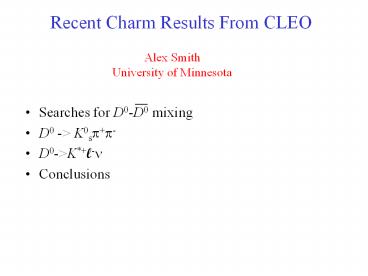Recent Charm Results From CLEO - PowerPoint PPT Presentation
Title:
Recent Charm Results From CLEO
Description:
Recent Charm Results From CLEO. Searches for D0-D0 mixing. D0 - K0sp p- D0- K* l-n ... Recent Experiments: CLEO, FOCUS, Belle, BaBar, E791. Recent Predictions: ... – PowerPoint PPT presentation
Number of Views:37
Avg rating:3.0/5.0
Title: Recent Charm Results From CLEO
1
Recent Charm Results From CLEO
Alex Smith University of Minnesota
- Searches for D0-D0 mixing
- D0 -gt K0spp-
- D0-gtKl-n
- Conclusions
2
1) Large x 2) x gtgt y 3) CP
violation of any kind
3
D0 D0 Mixing Analyses Preliminaries
Complication Strong phase ds due to final
state interactions
Use D0s from D decays to tag flavor of D0
D
D0p
x and y are what we really want
Categorize D0 decays according to flavor of D0
and of K Right sign (RS) Wrong sign
(WS)
Cabibbo-favored (CF) decays
x, y, or doubly Cabibbo-suppressed decays (DCSD)
4
Current Status of D0-D0 Mixing
Recent Experiments CLEO, FOCUS, Belle, BaBar,
E791
Recent Predictions
x
y
non-SM
(x, y, etc.)
(1/2Amplitude2)
5
Motivation to Study D0-gtKs0pp-
- Measure x and y rather than x2 and y
- RS and WS occupy the SAME Dalitz plot
- First measurement of relative strong phase
between D0 and D0 to to K0spp- final state - Only mode with sensitivity to sign of x!
- Doubly-Cabibbo-suppressed modes
- Comparable sensitivity to y as CP eigenstate
(eg., D0-gtKK-) analyses - Better scaling of sensitivity to x with int.
luminosity than D0-gtKp- analysis - Low backgrounds 1!
- Flat efficiency in ee- collisions
6
D0-gtKs0pp- Dalitz Formalism
Visualize as pseudo-two-body decay
Amplitude for each resonance given by a
relativistic Breit-Wigner, with angular
distribution determined by J. For J 1 we have
Total amplitude is the sum with a complex
coefficient
We consider 18 resonant and non-resonant decay
modes
7
Contributions to the Dalitz Plot
f2(1270)
K(1680)-
w
K
r0(1700)/ r0(1450)
f0(1370)
K2(1430)-
r0
K0(1430)-
K-
f0(980)
K0(1430)
8
Dalitz Plot
Fit Result
Data
9
Results of Dalitz Plot Fit
Component Amplitude Phase (0) Fit Fraction
K(892)
r(770)0
w(792)
K(892)-
f0(980)
f2(1270)
f0(1370)
K0(1430)-
K2(1430)-
K(1680)-
Non-res.
10
D0-gtKs0pp- Summary
- First observation (4.5s) of WS D0-gtK0pp-
- We observe 5 new submodes (10 total) of this
decay - First measurement of strong phase shift ds
between D0-gtK0pp- and D0-gtK0pp- (-3
/- 14)0 - Time-dependent analysis can measure sign of x
(coming soon!) - This is the best mode in which to search for
mixing - y is likely to be comparable to or larger than x
gt must measure strong phase
11
D0-gtKe-n
- Reconstruct K in Ks0p, Ks0-gt p p- mode
- Advantages of this mode
- Only mixing contributes to WS signal
- Distinct proper time distribution of mixing
t2e-t - K mass cut rejects backgrounds
- Drawbacks of this mode
- Low momentum tracks due to pppen final state
- Soft e momentum due to forward neutrino favored
by V A coupling - Must pseudo-reconstruct the undetected neutrino
- Only sensitive to x
12
D0-gtKe-n Fit to the Right-sign Data
Distributions from Monte Carlo
13
D0-gtKe-n Fit to the Wrong-signed Data
Fit distributions from Monte Carlo
14
D0-gtKe-n
- Systematic uncertainties
- Signal and background shapes
- MC Statistics
- Resolution and background parameters
- Differences in RS and WS efficiencies
- Results to be combined with D0-gtKl-n analysis
- Comparable sensitivity
15
Other CLEO Charm Analyses in Progress
16
Summary
D0-gtK0pp-
- First observation (4.5s statistical significance)
of DCSD D0-gtK0pp- (prelim.) - We observe 5 new submodes of this decay
- First measurement of strong phase shift ds
between D0-gtK0pp- and D0-gtK0pp- (-3 /- 14)0
(prelim.) - First analysis that can measure sign of x (coming
soon!) - Best channel in which to search for mixing
D0-gtKl-n
17
D0-gtKs0pp- Time Evolution of the Dalitz Plot
Mass eigenstates are also eigenstates of CP
Time evolution is given by
Evaluating ltf D1gt and ltf D2gt, collecting
terms with similar time-dependence, and squaring
the amplitude gives
- CP-even and CP-odd intermediate states provide
sensitivity to G1 and G2, thus y - Sensitivity to sign of x DM/G through sin term
in M2 - Interference between Cabibbo-favored and DCSD may
enhance sensitivity to x































